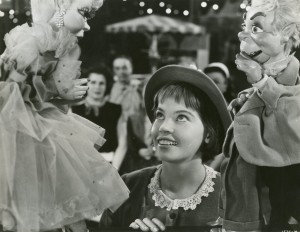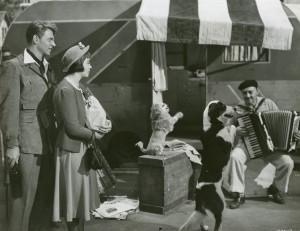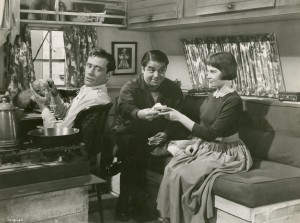by Barb Lentz.
The five movies Bob provided me from which to choose were these:
The Best Man (1964)
Lili (1953)
The Picture of Dorian Gray (1945)
Running on Empty (1988)
Union Station (1950)
I chose Lili because it is a musical, and the closest we have come to one before this was Coal Miner’s Daughter. The other choices were more political or involved crime so this was a clear departure, and I wanted to watch something a little lighter, especially after the Italian film we just saw.
The French know about romance and charm, and this (American) movie proves that beyond all doubt. A teenaged orphan, Lili (Leslie Caron) travels to a French town to find work, but is instead swept into the whirlwind of a carnival existence when she inadvertently becomes part of a puppeteer’s act. The puppeteer is Paul (Mel Ferrer), who has never recovered psychologically from a war injury that ended his career as a dancer. Lili likes Marc (Jean-Pierre Aumont), a magician who shows kindness to her when all seems lost. What keeps her at the carnival, however, is the interaction she begins with four puppets.

Since the death of her father, Lili has has no one to care for or about her, and vice versa. She quickly grows to love the puppets — Lili’s discussions of life with the puppets become the crux of the puppeteer’s act, and push it to new heights of success. People respond to the manner in which Lili talks to the puppets and listens to them, just as if they were human. This is not only charming, but quite moving. But it is only a matter of time before Lili has to resolve the matters of her crush on Marc and her tempestuous relationship with the puppeteer Paul.
I thought there would be more music in this musical. Apart from the popular, catchy song “Hi, Lili, Hi-Lo” there are no other songs! There are two dancing sequences and a lot of incidental carnival music, but I expected actual songs. But “Hi-Lili, Hi-Lo” is absolutely charming, especially when Lili matches the hand movements of the puppet Carrot-Top and they harmonize.
My top five aspects of the movie are:
1. The puppets! Each one — Carrot-Top, Marquerite, Reynaldo, Henry the Giant — is unique and memorable. It is fascinating how a puppeteer — in this case, Mel Ferrer, with help from Kurt Kasznar — can make each puppet move and sound separate and distinguishable from the others. Each has its own personality, which then reflects that of the puppeteer.

2. The carnival atmosphere. Kids used to dream about running away to join the circus or the carnival because it seems like a fun life; this film does nothing to dispel that notion. Lili’s work in the puppet act isn’t work at all to her, and during the day she can roam around at will and watch the dog act rehearse, or acrobats or the can-can girls, or Marc practicing his magic. This atmosphere helps keep Lili in her childlike state of wonderment as she gradually begins to blossom into a woman.
3. The depth of the characters. Musicals are not known for having the strongest of character roles, yet that isn’t the case with Lili. My favorite is Jacquot, who acts as a buffer between innocent Lili and bitter Paul. It is clear that Jacquot truly cares for Paul, and he comes to feel the same way about Lili. And it is partly because he does not feel the same way about Marc that our feelings about Marc begin to change. The acting of Leslie Caron is genuinely touching, and the men (Jean-Pierre Aumont, Mel Ferrer, Kurt Kasznar) are all realistic and convincing.
4. I like the way that dancing is used to develop the story line instead of being mere entertainment. The first dance, the “Adoration Ballet,” is from Lili’s perspective as she imagines competing for Marc’s romantic attention against the older and more sophisticated Rosalie (Zsa Zsa Gabor). Lili even dresses and dances like Rosalie in this sequence, to prove to Marc that she is woman enough to tempt and handle him. The second dance is even more important, as Lili imagines live, adult versions of the puppets accompanying her away from the town. But one by one each of them turns into Paul, kisses her, and runs back toward town. Subconsciously Lili is realizing that Paul is the voice and the trembling hand behind the affection that Carrot-Top, Henry, Marguerite and Reynaldo have shown her.

5. The sophistication of the script. Nothing is simple or childish in this tale. Lili is actually thinking about suicide before Carrot-Top begins to talk to her. Paul is able to save Lili by appealing to her innocence as Carrot-Top, but Lili really saves Paul by finally recognizing his feelings for her and accepting him. Handsome Marc is established as an early love interest, but is gradually shown to be unworthy of Lili’s devotion, and she finally recognizes this herself. The puppets, as individualistic as they are, together comprise the personality of their handler, Paul, and offer him a way to communicate without visually revealing himself. The dancing reinforces the plot, and the song “Hi Lili, Hi-Lo” — which is really about love being sad — is perfectly suited to the story.
We took so long to review this movie — I don’t know why — that we actually saw it twice. I liked it even better the second time. Is Lili a classic? Yes! It is a novel, unique movie. Its premise is simple, but its execution is complex and rewarding. Everything works, and you really begin to care about these characters. It’s really good in every way. I think it may be my favorite of all the movies we’ve seen so far.
BRL 1 August 2015.
Lili (July 10, 1953) MGM.
Directed by Charles Walters.
Screenplay by Helen Deutsch. Based on a story by Paul Gallico.
Principal Cast (character, performer)
Lili Daurier Leslie Caron
Paul Berthalet Mel Ferrer
Marc Jean-Pierre Aumont
Rosalie Zsa Zsa Gabor
Jacquot Kurt Kasznar
Peach Lips Amanda Blake
81 minutes. Technicolor. Not Rated.
